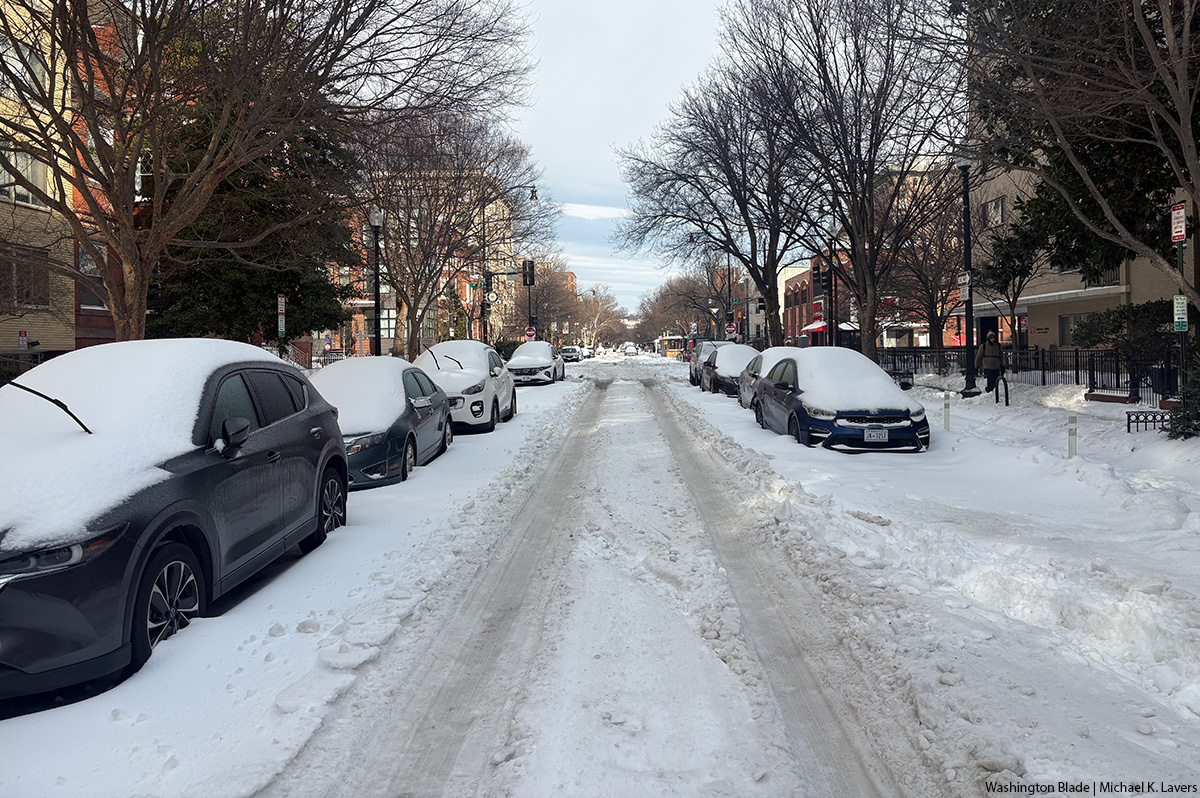Opinions
Putting their bodies on the line to fight ACA repeal
Members of ADAPT fighting in tradition of ACT UP

 “The bruises started appearing this morning and I imagine my arm will be covered in pretty colors over the next few days,” Anita Cameron, 52, a member of the national disability rights group ADAPT, who’s “proud” to be a “disabled Black lesbian” recently emailed me.
“The bruises started appearing this morning and I imagine my arm will be covered in pretty colors over the next few days,” Anita Cameron, 52, a member of the national disability rights group ADAPT, who’s “proud” to be a “disabled Black lesbian” recently emailed me.
Cameron, along with other ADAPT members, hetero and LGBTQ, has been protesting the Republican effort to repeal the Affordable Care Act. To her, as is the case with so many who are disabled, elders, low income, LGBTQ — in any way vulnerable — health care isn’t a policy issue: It’s a matter of life or death.
Like ACT-UP members during the AIDS epidemic, ADAPT activists have been putting their bodies on the line. They’ve been engaging in civil disobedience, getting roughed up by the police and arrested to protest the Republicans’ devaluation of their lives. As I write, ADAPT members from D.C., Maryland and Louisiana are protesting outside the Republican National Committee headquarters. I’ve just heard that the RNC isn’t letting them in.
ADAPT members (many in wheelchairs, others with conditions from learning disabilities to diabetes) and their allies from children to elders have staged sit-ins and protests in Senate offices in more than 20 states from New York to Ohio to Colorado. Last month, 43 ADAPT advocates were arrested when they held a “die-in” to protest the health care bill outside Senate Majority Leader Mitch McConnell’s (R-Ken.) Capitol Hill Office.
Why are they willing to literally put their bodies on the line? To be arrested – to have police drag them out of their wheelchairs? Because the Republican health care bill contains $800 billion in Medicaid cuts. For people with disabilities these cuts would be devastating.
Medicaid enables people with disabilities to have more than the medical care and the medications they need. It provides “basic home and community services.” This means if you have a disability and need help getting dressed or with other personal care, Medicaid enables you to not only to get the help you need but to live at home in your community – instead of in an institution. These services would likely be eliminated if the Republican law is passed.
Obamacare expanded Medicaid to include more than 14 million people. If the Republican repeal effort is adopted, millions of people with disabilities – from severely disabled children to elders – would lose their Medicaid.
You may think this doesn’t matter to the LGBTQ community. But as a visually impaired lesbian, I’m here to tell you that it does. One in five Americans has a disability, according to the U.S. Census Bureau, and we’re every color, sexuality and gender on the rainbow.
Cameron was among those arrested when ADAPT protested in U.S. Sen. Rob Portman’s (R-Ohio) office in Columbus. “The police grabbed me by an arm and leg and dragged me from the building,” she said.
Cameron isn’t only blind. She has multiple sclerosis, diabetes and congenital cerebellar ataxia. “I just got on Medicaid a few days ago, and I am terrified that I will lose it if the Better Care Reconciliation Act [the Senate health care bill] or anything similar to it passes,” Cameron said.
If she loses her Medicaid, “I will be hospitalized and I will be placed in an institution, which will hasten my death,” she said. “This bill will kill people with disabilities, especially poor folks and seniors, particularly in communities of color and in the LGBTQ community.”
Priya Penner, who is queer, has participated in ADAPT protests in Columbus, Ohio and Rochester, N.Y.
“Medicaid means I can have my $35,000 wheelchair, I can attend Syracuse University — that I am able to have a future that includes a career in law and perhaps, children and a family,” Penner emailed the Blade.
Kudos to ADAPT! For some, health care is just political spin or a worry for others. For people with disabilities, it’s a personal and frightening reality.
Kathi Wolfe, a writer and a poet, is a regular contributor to the Blade.
Opinions
Why trans suffering is more palatable than trans ambition
We are most readily accepted when framed as victims

In the current media and political climate, stories of trans suffering move quickly. Stories of trans ambition do not.
A trans teenager denied healthcare. A trans woman attacked on public transit. A trans man struggling with homelessness. These narratives circulate widely, often accompanied by solemn op-eds, viral posts, and carefully worded statements of concern. The pain is real. The coverage is necessary. But there is a quieter pattern beneath it: trans people are most readily accepted when they are framed as victims—and most resisted when they present themselves as agents with desire, confidence, and upward momentum.
This distinction has sharpened in recent years. As anti-trans legislation has proliferated across statehouses and election cycles have turned trans lives into talking points, the public script has narrowed. Trans people are legible as objects of harm, but far less comfortable to many audiences as subjects of ambition. Survival is tolerated. Aspiration is destabilizing.
The reason suffering travels more easily is not mysterious. Pain reassures the audience. It positions trans people as recipients of concern rather than participants in competition. A suffering subject does not threaten status hierarchies; they confirm them. Sympathy can be extended without requiring a recalibration of power, space, or expectations. In this framing, acceptance remains conditional and charitable.
Ambition disrupts that arrangement. A trans person who wants more than safety—who wants money, authority, visibility, creative control, or institutional influence—forces a different reckoning. Ambition implies permanence. It implies entitlement. It implies that trans people are not passing through society’s margins but intend to occupy its center alongside everyone else.
You can see this discomfort play out in real time. When trans people speak about wanting success rather than safety, the response often shifts. Confidence is scrutinized. Assertiveness is reframed as arrogance. Desire is recoded as delusion. The language changes quickly: “unstable,” “narcissistic,” “out of touch,” “ungrateful.” In public discourse, confidence in trans people is frequently treated not as a strength, but as a warning sign.
Media narratives reinforce this dynamic. Even ostensibly positive coverage often relies on redemption arcs that center suffering first and ambition second—if at all. Success is framed as overcoming transness rather than inhabiting it. A trans person can be praised for resilience, but rarely for dominance, excellence, or command. Achievement must be softened, contextualized, and made reassuring.
This is especially visible in cultural reactions to trans people who refuse modesty. Trans figures who express sexual confidence, professional competitiveness, or political authority routinely face backlash that their cis counterparts do not. They are accused of being “too much,” of asking for too much space, of wanting too much too fast. The underlying anxiety is not about tone; it is about proximity. Ambition collapses the safe distance between observer and observed.
Politically, this preference for suffering over ambition is costly. Movements anchored primarily in pain narratives struggle to articulate futures beyond harm reduction. They mobilize sympathy but have difficulty sustaining leadership. A politics that can only argue from injury is perpetually reactive, always responding to the next threat rather than shaping the terrain itself.
This matters in a moment when trans rights are no longer debated only in cultural terms but in administrative, legal, and economic ones. Influence now depends on institutional literacy, long-term strategy, and the willingness to occupy decision-making spaces that were never designed with trans people in mind. Ambition is not a luxury; it is a prerequisite for durability.
Yet ambition remains suspect. Trans people are encouraged to be grateful rather than demanding, visible rather than powerful, resilient rather than authoritative. Even within progressive spaces, there is often an unspoken expectation that trans people justify their presence through pain rather than through competence or vision.
This is not liberation. It is containment.
A society that can tolerate trans suffering but recoils at trans ambition is not offering equality; it is managing discomfort. It is willing to mourn trans deaths but uneasy about trans dominance, trans leadership, or trans desire that does not ask permission. It prefers trans people as evidence of harm rather than as evidence of possibility.
None of this is an argument against documenting suffering. That work remains essential, particularly as legal protections erode and violence persists. But suffering cannot be the only admissible register of trans life. A politics that cannot imagine trans people as ambitious cannot sustain trans people as free.
Ambition does not negate vulnerability. Desire does not erase harm. Wanting more than survival is not ingratitude—it is the baseline condition of citizenship. The question is not whether trans people deserve ambition. The question is why it remains so unsettling when they claim it.
Until that discomfort is confronted, acceptance will remain conditional. Sympathy will remain cheap. And trans futures will continue to be negotiated on terms that stop just short of power.
Isaac Amend is a writer based in the D.C. area. He is a transgender man and was featured in National Geographic’s ‘Gender Revolution’ documentary. He serves on the board of the LGBT Democrats of Virginia. Contact him on Instagram at @isaacamend

First what isn’t. That would be snow removal in D.C. I understand the inches of sleet that fell on the nearly four inches of snow, and historic days of freezing weather, make it very difficult. But it took three days until they brought out the bigger equipment. Then businesses and homeowners were told they wouldn’t be fined for not clearing their sidewalks, which they have to do by law. That clearly made things worse. The elderly and disabled have an exemption from that, others shouldn’t be given one. Then there was no focus on crosswalks, so pedestrians couldn’t get around, and no apparent early coordination with the BIDS.
Then there are about 2,200 National Guard troops strolling D.C., yes strolling, at least before the snow. Why weren’t they given immediate snow removal duty. If the president gave a damn about our city he would have assigned them all to help dig out the city. We could have used their equipment, handed out shovels, and put the Guard to use immediately. Maybe the mayor put in her request for the Guard a little late.
I have met and chatted with many Guard members across the city. A group from Indiana regularly come to my coffee shop, though I haven’t seen them since the snow. I always thank them for their service — I just wish it wasn’t here. Nearly all agree with me, saying they would rather be home with their families, at jobs, or in school. I’ve met Guard members from D.C., West Virginia, Indiana, Mississippi, and Louisiana. My most poignant meeting was with one Guard member from West Virginia the day after his fellow Guard member was murdered. Incredibly sad, but avoidable; she should never have been assigned here to begin with. The government estimates it costs taxpayers $95,000 a year for each deployment. So, again, instead of strolling the streets, they should have been immediately assigned to assist with snow removal. Clearly the felon, his fascist aides, and incompetent Cabinet, are too busy supporting the killing of American citizens in Minneapolis, to care about this. I thank those Guard members now helping nearly a week after the snow began to fall. I recognize this was a difficult storm. I hope the city will learn from this for the future.
Now for something happening in D.C. that shouldn’t be. A host of retreads have announced they are candidates for office in both the June Democratic primary, and general election. Some are names you might remember but hoped were long gone. Two left the Council under ethical clouds. One is Jack Evans. He announced his candidacy for City Council president. I like Jack personally, having known him since he served on a Dupont ANC. This race is a massive waste of time and money, as he will surely lose. Even before his ethics issues were made public, and his leaving the Council under a cloud in 2020, he ran for mayor in 2014. At that time, he received only 5% of the vote, even in his own Ward. At 73, he should accept his electoral career is over. Another person who left the Council over questionable ethics, Vincent Orange, who is nearly 70, announced he is running for mayor. He did that last in 2014, when he got only 2% of the vote in the primary. He is another one who will surely lose. Both will likely qualify for city funding, wasting taxpayer money. I know I will be called an ageist. But reality is, in most cases, it’s time for a new generation to take the lead. Another person who has served before, was defeated for reelection, is now trying for a comeback on the Council. I think the outsized egos of these individuals should not be foisted on the voters. If they are really interested in serving the community, there are many ways to do it without holding elective office.
Then there is ICE and the continuing situation in Minneapolis. I applaud Democrats in Congress for holding up long-term funding for ICE for at least two weeks and getting the felon to negotiate. Now not every ICE agent behaves like the gestapo, but their bosses condone the behavior of the ones who do. Secretary of Homeland Security, Kristi Noem, who shot her dog, and Trump’s Goebbels, Stephen Miller, seem to think nothing of causing the deaths of American citizens.
Now the felon’s FBI and DOJ are arresting journalists; then going to Georgia and removing stored ballots from the 2020 election, all because the felon is still obsessed with that loss. His disappearing DNI, Tulsi Gabbard, was involved in that for some reason. The felon is a sick, demented, old man. They must all be stopped before they completely destroy our democracy.
Peter Rosenstein is a longtime LGBTQ rights and Democratic Party activist.

Some people excuse the sick felon in the White House for confusing Iceland and Greenland, after all, they are both cold. Actually, he is a senile old fool, and people must consider whether he should be locked up and kept out of trouble. The only problem with that is J.D. Vance. He could be worse, because however disgusting, he is smarter. After all, he once compared Trump to Hitler.
The felon creates problems and then thinks when he backtracks on what he said or did, he should get credit for solving the problem he created. Recently the stock market plummeted 800 points in one day, based on the stupid things he said about attacking Greenland and imposing tariffs on our allies. When he changed his mind and backtracked, he took credit for the market going up. In some ways it simply looks like insider trading, when his friends and family knew what he was going to do. To others, it is simply a ploy to get Epstein off the front pages, and based on our media not doing their job, it’s working.
His speech in Davos was totally embarrassing. Joe Biden clearly lives in his head since he defeated him in 2020. He apparently blames Biden for the fact that during Biden’s presidency, Trump was charged and convicted of various crimes including 34 felonies.
He recently told the New York Times he can do anything he wants as president, as long as it doesn’t conflict with his own morality. Since he has none, he believes he can do anything. Now we see being King of the United States is not enough; he wants to be an emperor. Hence his formation of the ‘Board of Peace.’ Simply another way of grifting, as he is asking for a billion dollars from each member, and there are no obvious controls on the money. It will not be a success, again except for his looting it, when you look at who signed up to join this organization. Members include: three ex-Soviet apparatchiks, two military-backed regimes, and a leader sought by the International Criminal Court for alleged war crimes, with only two EU countries, Bulgaria and Viktor Orban’s Hungary, according to the Financial Times.
Then on his way out the door from Davos, he made the United States, and himself, look even worse, when as reported by CBS news, “President Trump claimed the U.S. had ‘never needed’ its NATO allies, and that allied troops had stayed ‘a little off the front lines’ during the 20-year war in Afghanistan.” This was entirely untrue and actually, “The only time NATO has ever enacted Article 5 was after the 9-11 terrorist attacks on the United States, and the world rallied to the support of the U.S.,” Alistair Carns, the U.K. government’s Minister of the Armed Forces and a veteran who served five tours in Afghanistan alongside American troops, said in a video posted Friday on social media. “We shed blood, sweat and tears together, and not everybody came home. These are bonds, I think, forged in fire, protecting U.S. or shared interests, but actually protecting democracy overall.”
More than 2,200 American troops were killed in Afghanistan, according to the Pentagon. The Reuters news agency says 457 British military personnel, 150 Canadians and 90 French troops died alongside them. Denmark lost 44 troops in Afghanistan — in per capita terms, about the same death rate as that of the United States.”
“Lucy Aldridge, the mother of the youngest British soldier killed in Afghanistan, told the BBC she was “deeply disgusted” by Mr. Trump’s comments. Her son William Aldridge was only 18 years old when he was killed in a 2009 bomb blast, while trying to save fellow troops.”
We are being represented on the world stage by a sick, evil, blathering idiot, who has no idea of history, no morality, and no decency. He was called out on this by the prime minister of the U.K., Keir Starmer, who normally appears to play up to the felon, when he called the remarks “insulting and frankly appalling.” He went on to say, “We expect an apology for this statement. Trump has “crossed a red line’, we paid with blood for this alliance. We truly sacrificed our own lives.”
Every day Trump slides more into the sewer, spreading hate, and violence, both here at home, and around the world. If there are any decent people left around him, unfortunately there may be none, for the good of humanity, they must stop him.
Peter Rosenstein is a longtime LGBTQ rights and Democratic Party activist.
-

 District of Columbia4 days ago
District of Columbia4 days agoD.C. Council gives first approval to amended PrEP insurance bill
-

 2026 Midterm Elections4 days ago
2026 Midterm Elections4 days agoLGBTQ Victory Fund looks beyond Washington for change in 2026
-

 National4 days ago
National4 days agoHuman Rights Watch sharply criticizes US in annual report
-

 Italy4 days ago
Italy4 days ago44 openly LGBTQ athletes to compete in Milan Cortina Winter Olympics



















